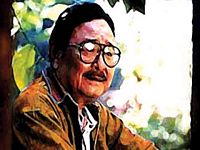The Horizon, Hemmed in Gold
The Horizon, Hemmed in Gold
Best friend,
yours is the right to raft down the smooth rivers,
to bushwhack through the black forests at night
and to freshen your senses in the streaming wind;
to sing to the fields a rice-growing song;
to turn your grin upward at the scattered stars;
to gaze at the tall grass through your tears,
or be embittered by a world lost in murk;
to coast as carefree as a swan in flight
or to sigh with the pine-tops from deep in your soul;
sow joy by the handful in somebody’s heart
while brimful of suffering in your own;
to break sod on a path for the impoverished;
to forsake your fine hair, soft as silk;
undaunted to rise, no matter who’s watching;
to hand out all your belongings, as your heart wills;
to keep on living for the people you love;
to shatter ignorant ranks and grind them to dust;
to hold your course steady, daring all for the Goal;
virtue to uphold, till the world itself ends;
for riverbends and moon-slivers, friends past beyond;
for the stalks of bamboo that bend on the mountains;
for the grains of rice scattered along every furrow;
for the horizon, hemmed in gold, before dawn.
ขอบฟ้ า ขลิบทอง
มิ่งมิตร
เธอมีสิทธิ์ ที่จะลอง แม่น้ำรื่น
ที่จะบุก ดงดำ กลางค่ำคืน
ที่จะชื่น ใจหลาย กบสายลม
ที่จะร่ำาเพลง เก่ยว โลมเรียวข้าว
ที่จะยิม กบดาว พราวผสม
ที่จะเหม่อ มองหญ้า นำ้าตาพรม
ที่จะขม ขื่นลึก โลกหมึกมน
ที่จะแลน เริงเลน เช่นหงษ์ร่อน
ที่จะถอน ใจทอด กบยอดสน
ที่จะหวาน สุขไว้ กลางใจคน
ที่จะทน ทุกข์เข้ม เต็มหัวใจ
ที่จะเกลา ทางกู สู่คนยาก
ที่จะจาก ผมนิ่ม ปิ้ มเส้นไหม
ที่จะหาญ ผสานท้า นัยน์ตาใคร
ที่จะให้ สิ่งสิ้น เธอจินต์จง
ที่จะอยู เพือคน ที่เธอรัก
ที่จะหัก พาลแพรก แหลกเป็นผง
ที่จะมุ่ง จุดหมาย ประกายทะนง
ที่จะคง ธรรมเที่ยง เคียงโลกา
เพื่อโค้งเคียว เรียวเดือน และเพื่อนโพ้น
เพือไผโอน พลิ้วพ้อ ล้อภูผา
เพือเรืองข้าว พราวแพร้ว ทัวแนวนา
เพื่อขอบฟ้ า ขลิบทอง รองอรุณ
Translator’s Note
“The Horizon, Hemmed in Gold” is the best-known poem from the collection of the same name, originally published in 1952 by Prakhin Chumsai na Ayutthaya under the pen name Ujjeni. (Ujjeni would later be named a “National Artist” in literature in 1987.) The poem gains its power through the range of worldly experiences—both good and bad, selfless and self-indulgent—it asserts as everyone’s birth right, the common inheritance of each individual. Yet every person is equally entitled to transcending these fluctuating conditions of joy and pain—the acts the poem mentions, of shearing one’s hair and forgoing material possessions, are perquisites of Buddhist monks, and the final image, of the horizon lit under dawn, is an obvious symbol of Enlightenment. Recognizing this spark of Buddhahood in everyone, the poem addresses each reader equally, and in tender terms: “best friend.”
 Noh Anothai was a researcher with the Thailand-United States Education Foundation (Fulbright Thailand) between 2011-12. In that time, he translated programs and hosted cultural events for Thailand’s Ministry of Culture and College of Dramatic Arts. The winner of Lunch Ticket’s inaugural Gabo Prize for Translation and Multi-Lingual Texts in 2014, Anothai has recently appeared in Structo (UK), RHINO, Pilgrimage, and others, and will appear in the July 2014 of Stirring as the winner of the Sundress Academy for the Arts’ OUTspoken contest.
Noh Anothai was a researcher with the Thailand-United States Education Foundation (Fulbright Thailand) between 2011-12. In that time, he translated programs and hosted cultural events for Thailand’s Ministry of Culture and College of Dramatic Arts. The winner of Lunch Ticket’s inaugural Gabo Prize for Translation and Multi-Lingual Texts in 2014, Anothai has recently appeared in Structo (UK), RHINO, Pilgrimage, and others, and will appear in the July 2014 of Stirring as the winner of the Sundress Academy for the Arts’ OUTspoken contest.





